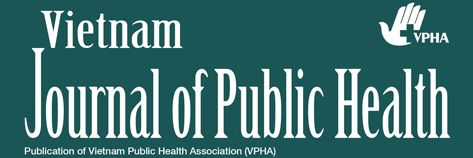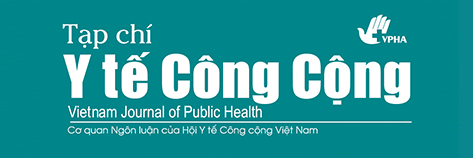Đánh giá sức khoẻ và sự tham gia của người cao tuổi trong phát triển cộng đồng tại 3 xã của huyện Tiền Hải, tỉnh Thái Bình năm 2010 (Assessment on health status and participation in community development of the elderly in 3 communes of Tien Hai district, Thai Binh province in 2010)
Tóm tắt
Kết quả của nghiên cứu tổng quan chính sách của Hội Y tế Công cộng Việt Nam và báo cáo thực hiện Chương trình hành động quốc tế về người cao tuổi (NCT) trong 5 năm của Ủy ban Quốc gia NCT cho thấy NCT ngày càng tham gia vào quá trình phát triển cộng đồng. Bài báo này trình bày đánh giá ban đầu nhằm tìm hiểu tình hình sức khoẻ và sự tham gia của NCT trong các hoạt động gia đình, xã hội và trong phát triển cộng đồng tại 3 xã của huyện Tiền Hải, tỉnh Thái Bình. Đánh giá được thiết kế cắt ngang, kết hợp phương pháp định lượng và định tính. Cỡ mẫu phỏng vấn định lượng là 958 NCT; thông tin định tính thu thập qua 6 thảo luận nhóm với NCT và 12 phỏng vấn sâu lãnh đạo của 3 xã. Kết quả chỉ ra rằng tỷ lệ NCT tự đánh giá sức khỏe bình thường cao (47,5%) nhưng số người NCT mắc một hay nhiều bệnh lý sức khoẻ cũng rất cao (97,4%). NCT tham gia các công việc gia đình (CVGĐ), xã hội (VHXH) và lao động sản xuất (LĐSX) chiếm tỷ lệ khá cao, lần lượt là 88%, 79,7% và 29,5%; ngoài ra nhiều NCT biết và tham gia trong công tác phòng chống tác hại (PCTH) thuốc lá và phòng chống lạm dụng rượu bia tại địa phương. Đặc biệt NCT trẻ từ 60-74 tuổi đa số còn sức khỏe và đang tham gia vào các công việc gia đình và xã hội theo hình thức tự nguyện và có nhu cầu được đào tạo kiến thức, kỹ năng. Tuy nhiên chính quyền địa phương vẫn thiếu công tác truyền thông và các văn bản hướng dẫn cho sự tham gia của NCT. Do đó, để khuyến khích sự tham gia của NCT, các chương trình can thiệp cần phối hợp với chính quyền địa phương xây dựng một cơ chế phù hợp. NCT tham gia vào các hoạt động giúp phát triển cộng đồng nên ở độ tuổi từ 60 -74, nhiệt tình, có kinh nghiệm chuyên môn.
English abstract:
The findings of desk study on elderly’s policy of Vietnam Public Health Association and report of 5 years implementing international action program on Aging of Vietnam Committee on Aging showed that the elderly has been involved more and more in the community development. This article will present our baseline survey with the aim of assess the health status and participation of the elderly in family, social activities and community development in 3 communes of Tien Hai district, Thai Binh province. That was a cross-sectional study combining qualitative and quantitative method. Sample size of qualitative interview was 958 older persons; while 6 group focus discussion and 12 indepth interviews were conducted for quantitative data in 3 communes. The findings showed that proportion of elderly who self-rated their health to be good was high (47.5%) but the number of elderly having at least one disease was significant (97,4%). Surprisingly, proportion of elderly who participated in family, social and manufacturing activities was quite high (88%, 79,7% and 29,5%, respectively); besides, there was also a quite high quantity of elderly who know and involve in tobacco control activities and alcohol control activities at the local site. Guideline documents for elderly’s participation are a gap in local policies. Specially, most of elderly aged 60-74 was healthy and participating in family and social work voluntarily. They also presented the demand for knowledge and skills training. However, local governments still lacked of communication activities and guidelines for encouraging the participation of the elderly. Therefore, we proposed to cooperate with local government to develop a network of Public Health Association at the grassroots level. The core group of this network were the enthusiastic young elderly aged 60-74 having professional experience to involve in developing the community.Từ khóa
Toàn văn:
PDF (English)##submission.citations##
Tiếng Việt:
Ban chỉ đạo Tổng điều tra dân số và nhà ở trung ương (2009). Báo cáo kết quả suy rộng mẫu. Hà Nội.
Bộ Y tế (2005), Tài liệu hướng dẫn mô hình cộng đồng không thuốc lá, Nhà xuất bản giao thông vận tải.
Đàm Viết Cương, Vũ Minh Hạnh (2006), Đánh giá tình hình lạm dụng rượu bia tại Việt Nam, Viện chiến lược và chính sách y tế Bộ Y tế.
Lê Văn Nhẫn, Nguyễn Thế Huệ (2004), Điều tra thực trạng NCT Việt Nam nhằm phát huy tài năng, trí tuệ của họ trong sự nghiệp công nghiệp hóa, hiện đại hóa tại Tp.HCM, Yên Bái và Sóc Trăng, Hội người cao tuổi Việt Nam
Quốc hội Việt Nam (2009), Luật Người cao tuổi, Luật số:39/2009/QH12
Tổng cục thống kê (2006). Điều tra biến động dân số 2006. Nhà xuất bản thống kê.
Ủy ban quốc gia về NCT (2008), Báo cáo 5 năm thực hiện chương trình hành động quốc tế Madrid về người cao tuổi, Nhà xuất bản Lao động.
Tiếng Anh:
Angel Rodriguez-Laso, Maria Victoria Zunzunegui, Angel Otero (2007). The effect of social relationships on survival in elderly residents of a Southern European community: a cohort study. Biomedcentral.
Aron S. Buchman, MD, Patricia A. Boyle, PhD, Robert S. Wilson, PhD (2009). Association between Late-Life Social Activity and Motor Declinein Older Adults. National Institute of Health.
ESCAP (2009), In the care the state and the family: Understanding Care of the Elderly through Macro and Micro Perpectives, Gender and Development Discussion Paper Series No.22
UNDP (2009). Human Development Report 2009. New York.
Vietnamese Studies (2009), The Elderly in Viet Nam, The Gioi Publishers No1-2009 (171)
WHO (2002). Active ageing: A policy framework. Geneva.



